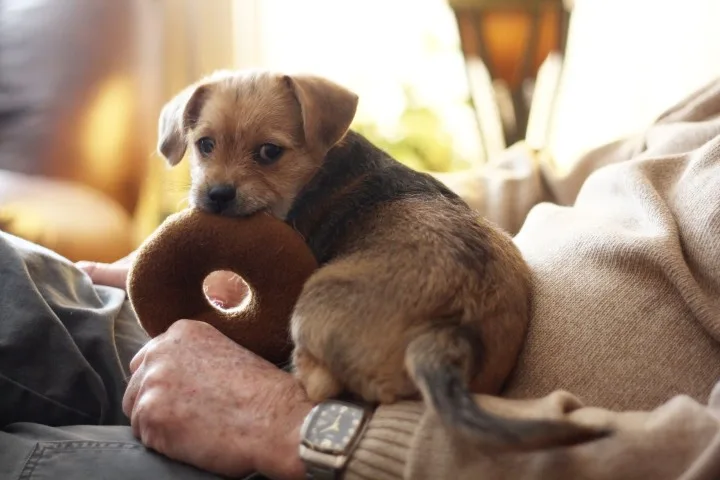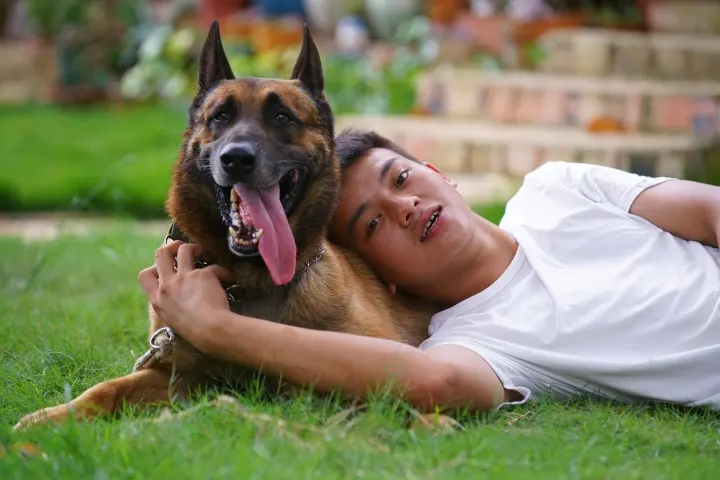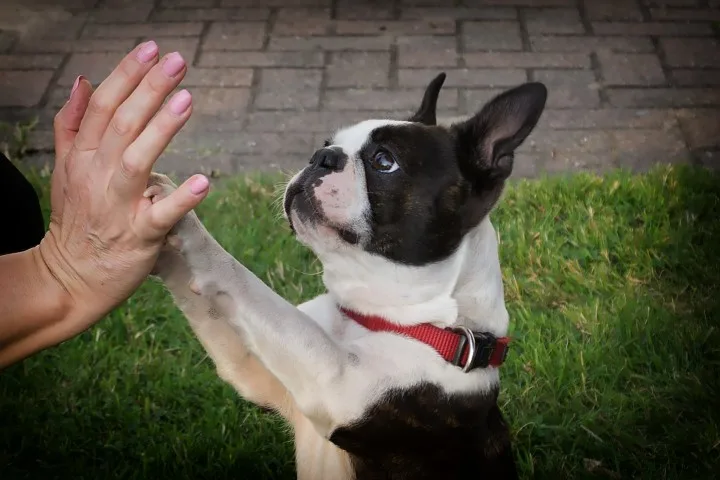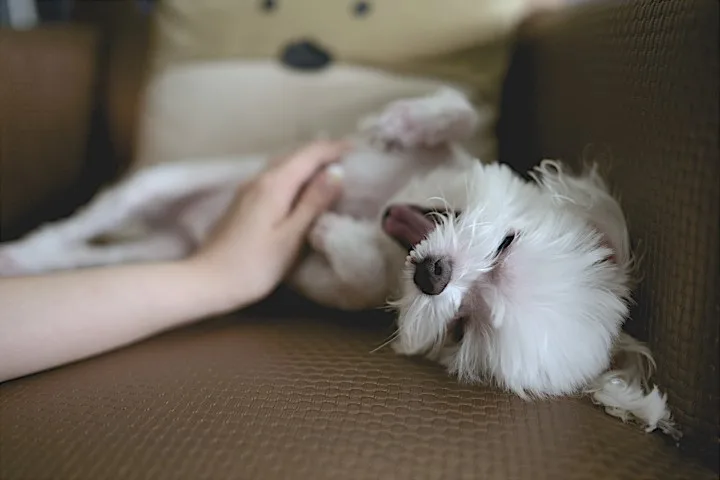Canines can be faithful best friends in every way imaginable. Whether providing protection and unconditional love or a reason to get out of the house, your four-legged companion won’t disappoint you.
However, dog ownership isn’t suited to every individual or household and has its challenges.
If you are thinking of bringing home a dog, here are five critical questions you need to ask yourself.
Questions To Ask When Bringing Home A Dog?
 1. Do I Have Money For A Dog?
1. Do I Have Money For A Dog?
First, we’ll tackle the most obvious question: Can you afford a pet?
The upfront cost of a dog can be significant. Purebred pups can go for upwards of several thousand dollars.
Of course, adopting an older dog from a shelter might only cost a hundred bucks, but that won’t be the only money you’ll spend on your pet.
Cost Of Food
Your dog will have to eat regularly. According to Rover.com, dog food can cost between $200-$1000 per year.
If you have a large dog, prepare to shell out even more. Your dog might also have dietary restrictions requiring expensive food.
Cost Of Supplies
 In addition to food costs, you’ll have to buy supplies for your dog. Leashes, crates, and toys can be a one-time cost but may need to be repurchased if your dog grows or these items break.
In addition to food costs, you’ll have to buy supplies for your dog. Leashes, crates, and toys can be a one-time cost but may need to be repurchased if your dog grows or these items break.
Pet supplies, such as dog poop bags or shampoo, must be purchased regularly.
Cost Of Regular Veterinarian Care
Puppies need medication to protect them from deadly diseases like parvovirus. Until they have had all their shots, it’s not safe to allow them to play with other dogs or in public spaces.
Grown-up dogs will also require regular veterinary visits to ensure they are healthy, and any concerns should be addressed promptly.
Cost Of Emergency Veterinarian Care
Pet owners don’t want their pets to experience accidents or illnesses, but unfortunately, these things can happen and come with a financial cost.
How will you pay for their care if your dog gets cancer or gets hit by a car? At ten months, One of my dogs developed entropion, a condition where the eyelid rubs against the eye.
Our vet informed us that our dog would need surgery to save his eye. The cost was estimated at over $2000.
We decided to cancel our yearly vacation to prioritize our dog’s health and get him the necessary care.
Cost Of Pet Insurance
If you don’t want to worry about costly surgeries and vet care, you might consider getting pet insurance for your dog.
Pet insurance rates will vary depending on your dog’s breed and can run between $30-$70 per month on average.
Pet insurance will save you money in the long run if your pet has a costly health need, but it will increase your monthly expenses.
2. Do I Have Space For A Dog?
 Take an honest look at your home. Do you have a fenced yard? Are you an apartment dweller? There are a million types of dogs, and they all have different needs. Your dog should fit in your space.
Take an honest look at your home. Do you have a fenced yard? Are you an apartment dweller? There are a million types of dogs, and they all have different needs. Your dog should fit in your space.
Permission For Pets
If you don’t own your home, you might not be allowed to have pets, or there might be size or breed restrictions.
Every dog up for adoption deserves a better life than constantly hiding indoors whenever the landlord drives by.
Outdoor Space
You don’t need acreage to have a happy dog, but you need space. If you want a big, active dog, you will need a large yard or community park nearby.
Some dogs, like Huskies, need secured backyards as they are prone to run away. At the very least, you should have enough easily accessible outdoor space for your dog to relieve themselves.
Indoor Space
Where will your dog spend most of its time? If you have expensive furniture, you’ll need to consider how to keep things from getting ruined or broken.
Most dogs shed, so you’ll have to vacuum. Some dogs do well in a smaller, designated room when you have to run errands. A laundry room or bathroom might do the trick.
Otherwise, you might need to invest in a crate to keep the dog when they are unsupervised.
Some dogs bark a lot. If you live in close quarters with other people, you must choose a quiet breed.
It’s possible to address barking through training, but it’s essential to keep in mind that some dogs may constantly bark to a certain degree.
It’s unrealistic to expect a dog prone to barking to always remain quiet.
3. Is My Lifestyle Suited For A Dog?
 You’ve got the money. You’ve got the space. Now, You need to ask yourself if how you live your life is appropriate for dog ownership.
You’ve got the money. You’ve got the space. Now, You need to ask yourself if how you live your life is appropriate for dog ownership.
Exercise
To keep dogs healthy and happy, they must be walked daily, not just a few times a week.
Certain dogs require a significant amount of exercise. Otherwise, they may become unhappy and cause distress to their owners.
The pent-up energy of an inactive dog can often turn destructive. Depending on the breed, you may need to plan on being home to take your dog out several times a day.
Some more intelligent breeds need mental as well as physical exercise. Usually, this means training beyond basic “sit” and “stay.”
Help your dog exercise mentally by teaching it special tricks or participating in obedience shows.
There are games you can play with your dog, or you can teach them to do specific simple jobs around the house. By giving dogs a job to do, you can channel their energies into productive activities.
Otherwise, they might find things to do on their own, and chances are you won’t like their ideas.
Traveling
Dogs can cramp your travel style, too. You must ensure you have a dependable dog sitter whenever you need to leave town for more than a few hours.
Dogs aren’t like cats. You can’t leave them alone with an entire bowl of food and a clean litter box.
If you work long hours or have a job that requires travel, a dog might not be the best companion unless you can afford a regular sitter.
Mess
 Becoming a pet owner is similar in some ways to becoming a parent. It brings a lot of new joys but also a lot of mess. Are you comfortable with urine, excrement, and vomit?
Becoming a pet owner is similar in some ways to becoming a parent. It brings a lot of new joys but also a lot of mess. Are you comfortable with urine, excrement, and vomit?
As a pet owner, at some point, you will need to clean these up unless you’re wealthy enough to pay someone else to do it for you.
Poop training a puppy will involve a lot of paper towels and gross smells.
Activities
If you want a dog who can join you for your weekend hikes, you need to make sure that you choose a breed that can keep up with you.
If staying at home with a book is more your style, you may have limited options regarding dog breeds, as most dogs require some exercise.
Family
If you have kids or a spouse, they need to be on board with the plan for your dog. Make sure everyone knows who is responsible for your dog.
Who will do weekday walks? Who will feed the dog in the mornings?
What about the evenings? If you work most of the time, don’t assume your kids or spouse (or roommate) will pick up your slack.
The same goes for training. If you want a well-behaved dog, everyone in the family must participate.
If your dog has to follow different rules depending on who is home, they won’t ever learn how to follow them.
Does anyone in your house have allergies? If so, you’ll need a hypoallergenic dog, such as a labradoodle.
Sometimes, people can manage pet allergies with medications or allergy shots, but not always. It’s a good idea to ensure no one will be allergic to your new family member before bringing them home.
4. Can I Commit Long-Term?
 On average, a dog will live around 13 years, but some can live to be 18 years old. When you adopt a pet as a family member, you’re making a commitment that may last several decades.
On average, a dog will live around 13 years, but some can live to be 18 years old. When you adopt a pet as a family member, you’re making a commitment that may last several decades.
Think about what your life will look like in 5, 10, or even 15 years. Do you plan on moving around a lot? Joining the military?
What about kids? Your dog will be there for all these potential changes. Adopting a dog, knowing you can only keep them for a few years, is like getting married with a plan to break up.
Older Dogs
If you’re unsure you can commit to a pet for 15 years, there are still some options. You could adopt an older dog from a shelter.
Older dogs are frequently passed over by families hoping for a puppy. They may have fewer behavioral issues and are often already housebroken.
Fostering Dogs
Alternatively, you could become a foster home for dogs waiting for their “forever families.” This represents a shorter commitment without abandoning the idea of having a dog in your home.
Fostering dogs would also give you experience with pet ownership, dog training, and different breeds. When you’re finally ready for your dog, you will be much more prepared.
5. What Kind Of Dog Should I Get?
 With all the above questions in mind, do your research when it comes to breeds. If you know you won’t want to take a dog on a run daily, don’t get a border collie.
With all the above questions in mind, do your research when it comes to breeds. If you know you won’t want to take a dog on a run daily, don’t get a border collie.
If you want a dog that will be friendly to all strangers, don’t adopt a German shepherd.
Huskies need extra tall fences, whereas Anatolian shepherds need big backyards.
The dog that fits your life might not be the dog you think is cutest, but that’s okay. You’ll both be much happier with a close match.
A Cautionary Tale
 I grew up with dogs. My family home always had at least one (but sometimes more) big, slobbery dog in it. They were family dogs, but they loved my mom and dad the most.
I grew up with dogs. My family home always had at least one (but sometimes more) big, slobbery dog in it. They were family dogs, but they loved my mom and dad the most.
I looked forward to the day that I had my own space and could have a dog who was just mine. That day finally came when my husband and I purchased our first home.
We did our research. My husband is a runner and wanted a pet that could accompany him on his daily jogs.
We both enjoyed weekend adventures of camping or hiking. I also wanted a big dog to protect my house when my husband worked the night shift.
We knew we eventually wanted kids, so we needed a breed that would be good with children.
After much consideration, budgeting, and studying, we decided that a Chesapeake Bay Retriever would be the best match for us.
We were right at first. We adopted Murphy, a 12-week-old Chesapeake puppy who quickly became an integral part of our lives.
He was high-energy, but we had the money, the time, and the lifestyle to suit him. He was our buddy, joining us for road trips, camping, and hanging out around the house.
When Murphy was three, we discovered we were expecting our first child. We were thrilled to see our family grow and thankful that we had chosen a dog breed known to be good with kids.
When my daughter was born, Murphy didn’t seem to care much, but he was never aggressive. He just pretended like she wasn’t there.
As she grew, they never bonded the way we had hoped. He only had eyes for us, and he was so energetic he often knocked her over with his exuberance.
Parenting took up much more of our time than we had expected when our daughter had a slew of health issues. Our active lifestyle took on a much slower pace.
No matter how hard we tried to get back into the swing of things, we couldn’t dedicate as much time to Murphy as we had before.
He kept getting the leftovers of us, and we felt terrible. He was still the same sweet dog he’d always been, but he started to bark and disobey more as we fell behind on his training.
It wasn’t until we became pregnant with our second child that we decided to face the facts- we were not Murphy’s ideal home anymore. He loved being an “only child.”
He needed much more exercise than we could give him, and no one was thriving in the current situation.
We contacted our local Chesapeake Bay Retriever Rescue, and within a few months, Murphy was once again an only child- in a different home with no human babies.
The moral of this story? Even if you ask all the right questions and make all the proper preparations, things don’t always turn out perfectly.
The important thing is to keep the well-being of your (potential) dog at the forefront of your mind. Dogs are living creatures with emotions and preferences, not accessories or inanimate objects.
Do your best to make sure you and your dog are best suited for each other, but if that isn’t the case, ask for help.
You are responsible for your dog’s quality of life and should always put their interests above yours.
Conclusion
You’re getting ready to bring home a dog, and you’re doing your homework. That’s a significant first step. It’s not just about what dog is cutest- you need to look at your budget.
You must ensure you have enough space in your home for a pet. Also, ensure your schedule and lifestyle have the flexibility to fit a dog for the long term.
If all these considerations are checked out, enjoy your life with your new dog!
Our team is composed of pet care professionals, veterinarians, and pet owners. To date, we’ve conducted thousands of hours of research to publish the most accurate pet information.
Most of the writers on our site are vets with 10+ years of clinical experience, ranging from small practice, to equine practice, academia, and surgery. Our goal is to help every pet owner get the information they seek about their dear companions.



Leave a comment
You must be logged in to post a comment.